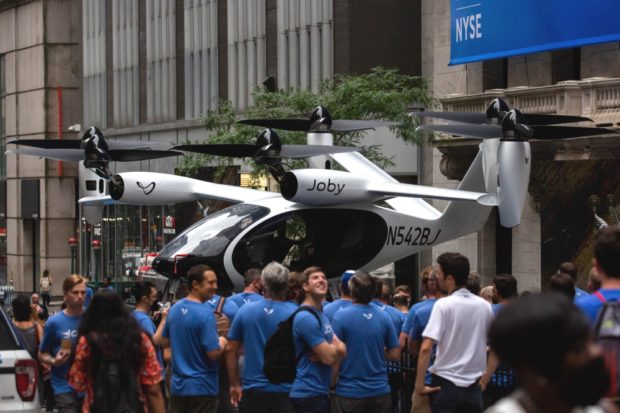Joby Aviation Inc., a startup vying to be among the first to fly a new class of electric air taxis, said one of its aircraft was involved in an accident, sending the shares tumbling.
The Feb. 16 incident involved a remotely piloted prototype at the company’s test base in California, according to a regulatory filing. There were no injuries, the company said without detailing the specifics of the accident.
“Experimental flight test programs are intentionally designed to determine the limits of aircraft performance, and accidents are unfortunately a possibility,” Joby said.
The U.S. National Transportation Safety Board is investigating the accident, which resulted in “substantial damage” to the aircraft, spokesman Peter Knudson said. The NTSB’s authority to investigate all aviation accidents includes most serious drone crashes.
Joby said in the filing that it’s supporting authorities in an investigation.
The shares fell 6% at 11:54 a.m. in New York after an earlier decline of 11%, the biggest intraday slide since Jan. 24.
Joby is one of several startups building electric aircraft that take off vertically like helicopters and then fly like small planes once in the air. Joby is seeking regulatory authorization to fly with an onboard pilot its five-seat air taxi, which has a maximum range of 150 miles (241 kilometers) and a top speed of 200 mph (322 kph).
The accident could complicate Joby’s effort to win approval for the ground-breaking plane, which has already made more than 1,000 successful flights. The startup has said it expects to receive authorization from the Federal Aviation Administration and fly its aircraft commercially by 2024.
The flight test involving the accident was not for FAA credit, Morgan Stanley analyst Kristine Liwag wrote in a research note. The company has a second aircraft with which it will likely continue test flights.
Door Still Open
“In our view, the accident with the Joby aircraft does not close the door on FAA certification,” Liwag said. “However, the cause of the accident must be understood.”
Aerospace is a “difficult technical industry,” Liwag said. The analyst highlighted that General Dynamics Corp.’s Gulfstream unit suffered an accident in 2011 during test flights of its G650 jet. That plane went on to be one of private aviation’s most successful and profitable aircraft. The Gulfstream crash killed four employees.
“This execution risk highlights why we have such a wide range of outcomes for Joby considering the nascency of the industry,”
said Liwag, who rates the stock the equivalent of a buy.
Photo: A Joby Aviation aircraft outside the New York Stock Exchange during the company’s initial public offering in New York, in Aug. 2021.Photographer: Michael Nagle/Bloomberg
Source: Bloomberg

